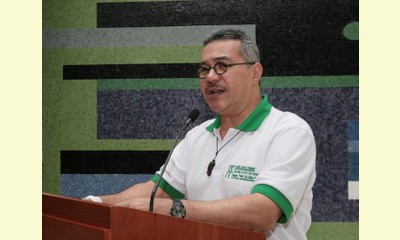|
|
How to achieve a culture of peace in Venezuela
un article par En Oriente
The pastor and coordinator of the Peace Chair of the Central University of Venezuela (UCV ), Raul Herrera, spoke with Solutions on how to achieve a culture of peace in the country. He considers it necessary to "construct it quickly" in order to reduce the violence that has arisen since 12 February.

Raúl Herrera, director of the Peace Chair of the Central University of Venezuela
click on photo to enlarge
He defined culture of peace as a set of values, attitudes and behaviors that reject violence and prevent conflicts by tackling their root causes to solve problems through dialogue and negotiation among individuals and nations, among others.
The anthropologist and doctor in Social Sciences Enoé Texier, said that this must be dynamic to be variable and progressive.
Herrera said that if citizens do not respect the different opinions of others, in his view, the culture of peace "will be difficult to successfully achieve."
He explained that one of the alternatives to build agreements between the government and opposition it is necessary to "mobilize for the common good ."
Referring to the proposal of dialogue promoted by the National Government that has been implemented in several states, Herrera said that this arose from the lack of control over "improper actions " that were generated in different municipalities.
He advised the opposition and government officials to formaly request the Vatican to participate in an approach to dialogue and clarified that "the invitation should be sent as a matter of common interest to both parties."
Regarding the creation of the National Human Rights Council by the President of the Republic, Texier said the mechanism is laudable, but it has not been done with enough transparency.
These experts repudiated the violence that originated on the campus of the Central University of Venezuela and stated that solutions should be established for these problems. "We need to create forums , lectures , exhibitions, on human rights," said the professor.
Herrera invited citizens to address nongovernmental organizations, the Public Prosecutor, and the Ombudsman to report the assaults that are considered to have occurred in the country.
(Click here for a Spanish version of this article)
|








|
DISCUSSION
Question(s) liée(s) à cet article:
What is your impression of the new direction being taken in Venezuela?,
* * * * *
Commentaire le plus récent:
Once again in the beginning of 2014 there are many demonstrations that seemed aimed at overthrowing the Venezuelan government.
Is the United States supporting them in order to abolish a leftist government in "its" hemisphere?
And for an assessment by Tom Hayden, a veteran peace activist of the US and a hero for many of us during the 60's, see his blog.
Hayden states that Obama may not be aware of it, "But there's another US "government", a secret network that works tirelessly to undermine any Latin American threat to the dominance of American capital and military power. They understand that the president must be provided with "plausible deniability", and so they keep Obama out of the loop. Sometimes they operate through the CIA, sometimes under Republican-Democratic "democracy promotion" programs, sometimes through third parties such as the Florida-based FTI Consulting. Democratic Party political consultants and pollsters have worked for Venezuela's opposition. It's difficult even for a president to keep a grip on it all. And that being the case, transparency disappears for the US Congress and public."
Who says there is no "culture of war"?
P.S. In a similar vein, see the analysis by Eva Golinger.
On the other hand, there are complaints of human rights violations against the protesters by the police.

|
|









